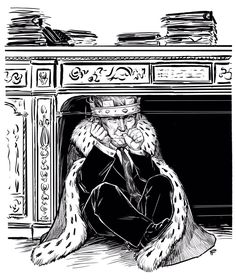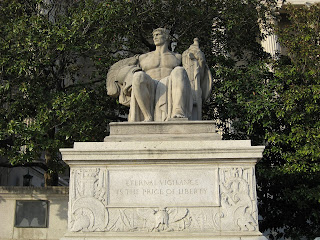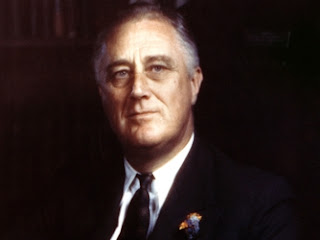The demagogue is the curse of the modern world, and of all the demagogues, the worst are those financed by well-meaning wealthy men who sincerely believe that their wealth is likely to be safer if they can hire men with political "it" to change the -- the sign posts and lure the people back into slavery. Unfortunately for the wealthy men who finance movements of this sort, as well as for the people themselves, the successful demagogue is a powerful genie who, when once let out of his bottle, refuses to obey anyone's command. As long as his spell holds, he defies God Himself, and Satan is turned loose on the world.
-- Henry A. Wallace, VP, United States
 |
| 21st Century Demagogue |
JESUS
It's you that say I am.
I look for truth and find that I get damned.
PILATE
But what is truth?
Is truth a changing law?
We both have truths.
Are mine the same as yours?
--Jesus Christ Superstar
Napoleon said history is a set of lies agreed upon.
Faulkner said the past isn't dead. It isn't even past. (Which recent controversy about statues of Robert E. Lee must confirm.)
 |
| 20th century Demagogue |
Outside the National Archives in Washington, D.C. where they keep the Declaration of Independence and other secular but sacred documents of the American experiment, is a marble statue of Liberty with Shakespeare's words, "What is Past is Prologue."
The past, of course, like all memory, is a reconstruction, is fluid and not entirely trustworthy. But events did happen, once, and while they may have been perceived differently by different people and groups at the time, there is some sort of objective truth which goes beyond perception. Even in the "post truth" Trumpian age, we have to believe that.
There is a famous experiment from MIT where a professor is giving a lecture and when he turns his back to the class to write on a black board, a student shouts out a question just as a man runs in and steals a glass bowl from the desk behind the professor and runs out the door with it. This causes a kerfuffle but when the students settle down, the professor asks them, "Wow. Did you see that guy with the curly hair steal the bowl?" And of course most students did remember that. The trouble is, the guy who stole the bowl was wearing a hair and nobody could have seen hair curly or not. But most students could swear his hair was curly.
This is the classic statement about how memories can be contaminated.
Recently, a lawyer defending Alex Jones was interviewed on NPR and he was asked about Jones's claim that the children killed at Sandy Hook school in Newtown, Connecticut were child actors and the parents were "crisis actors" and that the whole thing was a big hoax concocted as a pretext for the federal government to seize everyone's guns. When challenged by the NPR interviewer, the lawyer asked the reporter if he had actually seen the dead children himself?
This is a new bar of sorts: Do you have to see the bodies in the morgue to believe that children were murdered? And even if you did, how do you know how those children died? Do you have to witness a murder to believe it was murder?
If this is the standard, can we ever bring a murder case to trial?
This same problem plays through the conspiracy theorists who deny the Holocaust or the Moon landing. How can you believe what you are told? If you did not see the event yourself, are you not always relying on someone else's report, somebody's testimony, memory truthfulness? This, by logical extension, means there is no verifiable truth, except what you see for yourself, and maybe, not even that.
One of the reasons Eisenhower opened up the concentration camps to photographers and journalists was to establish a record, so nobody would be able to deny it happened. And yet, we have deniers today, who say it was all staged.
What history would these people believe? Would they have to see the bodies being fed into the ovens? Would they deny those people were gassed unless they saw the event themselves?
How much proof is proof enough?
Oliver Stone's wonderful documentary, "The Untold History of the United States" is a tale which would make Howard Zinn smile. It is, as promised, the history we were not taught in high school. It makes one certain, if nothing else, that what we were taught was an officially acceptable story, not the whole story and maybe even a set of lies, agreed upon.
It is told not as a classic polemic; there is always the conditional beginning: "It is true Stalin sent millions to gulags and starvation, BUT, it is also true that..."
One of the most astonishing stories is about Franklin Delano Roosevelt's Vice President, before Harry Truman. Beyond Truman, I bet you cannot name any of the Vice Presidents who served with FDR. I could name Truman because I knew when FDR died Truman became President. But who knew about Henry A. Wallace?
I'm now trying to scramble to learn more about this remarkable soul, who gave the speech as World War II was ending and people were talking about the "American Century." Wallace said, he hoped the second half of the 20th century would not be the American century, but the century of the Common Man.
He suggested for all our differences with the Soviet Union, we should share one thing, a concern that the common man, that is all citizens, should share in prosperity and progress, not just the blessed few. Inspired by this address, Aaron Copeland wrote "Fanfare for the Common Man."
But J. Edgar Hoover and a wide swath of American politicians both Democrat and Republican, thought it an anathema, a commie/pinko manifesto.
The very idea: That all people might be equally entitled to the benefits of a robust economy.
Wallace was, in a sense, one of those rural doubters. He had been raised in a family which profited from the story of Reid superior corn, a hybrid which looked fantastic, with orderly rows of bright yellow kernels arrayed in perfect rows. Corn breeding contests gave blue ribbons to the best looking specimens of this breed, but Wallace doubted this was a superior corn. Corn should be judged not on appearance but "yield," which meant, how much actual corn per acre was present to feed livestock and people, once the corn was harvested, after expected dehydrating storage and transport. He proved by painstaking science the Reid variety, which had been sold for decades as the ultimate corn was a fraud, inferior to other varieties. He doubted and he was correct to doubt. Everyone else had accepted someone else's testimony and teaching.
What made him different from Alex Jones, among other things, is he actually did investigate his alternative hypothesis himself, measuring, growing corn himself until he had data, numbers and real observations he had made himself to support his claims and to convince others.
Wallace, and surprisingly Roosevelt, both loathed the British empire, the concept of imperialism and empire, which was essentially the culture of plunder. FDR told Churchill, after FDR visited an African British colony, that the people under British rule were living 5,000 years behind those of Great Britain, after 50 years of British rule, so clearly these natives had not benefited from the colonization, while Britain had sucked out all the diamonds and natural resources it could.
As Oliver Stone notes, , tens of thousands of Indian colonial troops serving the British, switched sides and swore allegiance to the Japanese when they were captured. These Indian troops may have been dupes but they were not dopes. Anyone who has read of the bloody Indian mutiny of 1857 will know substantial numbers of Indians were not admirers of the British who had come to civilize them, but chafed under that British rule, and took their revenge.
So the narrative of the plucky English stoically resisting the Nazi blitz and trying to protect India and Singapore looks a lot different if you think of the Japanese as liberating rather than raping. The fact is, Japanese troops committed widespread atrocities throughout China and literally raped Nanking and countless other Chinese cities. Japanese were unspeakably cruel to the British troops they captured and marched to Bataan. The Japanese did not think of war as a game of chivalrous knights. Soldiers who surrendered were regarded as dishonored and not worthy of anything more than death.
Even after Hiroshima, there were hardliners in the Japanese military who would not consider surrender. But there were many who thought the jig was up. According to Stone, many, even in the Japanese military thought the war was lost and surrender the only option even before Hiroshima, but as soon as the Russians launched their attack on Japanese armies in Manchuria and elsewhere. The Japanese were caught between the Americans on one side and the Russians on the other.
Had Wallace become Vice President in 1944--and he came literally within 5 seconds of doing that--Oliver Stone argues the bomb would likely never have been dropped on Hiroshima, and the Cold War and the endless surrogate wars including Korea and Vietnam avoided.
This is the stuff of Utopian fantasy novels, but it is worth dreaming about, if only as an exercise in looking forward to the idea of what if Trump and his henchmen could be defeated? What misfortune might we avoid. What joy might we gain?


























